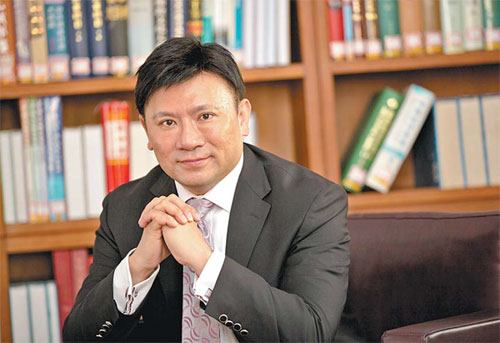Made in China: my brilliant career
Updated: 2015-03-13 08:06
By Joseph Catanzaro(China Daily Europe)
|
|||||||||||
Much has been made of the need for professionals with global career aspirations to get China on their CV, but does it really translate to career gains back home?
Late last year, after seven years living and working in China, Will Gray decided it was time to return to Europe. Professionally, the 33-year-old Englishman and graphic designer had made the most of his stint in China at a time when Europe was in the economic doldrums. He became fluent in Mandarin, taught design at a university and worked as a designer for a magazine and a clothing company before setting up his own design business in Beijing in early 2012.
But as Gray packed up his things in China and prepared for the move, he says one frighteningly big question mark loomed over the next stage of his professional life: Would his experience in China translate into a career gain when he returned to Europe?
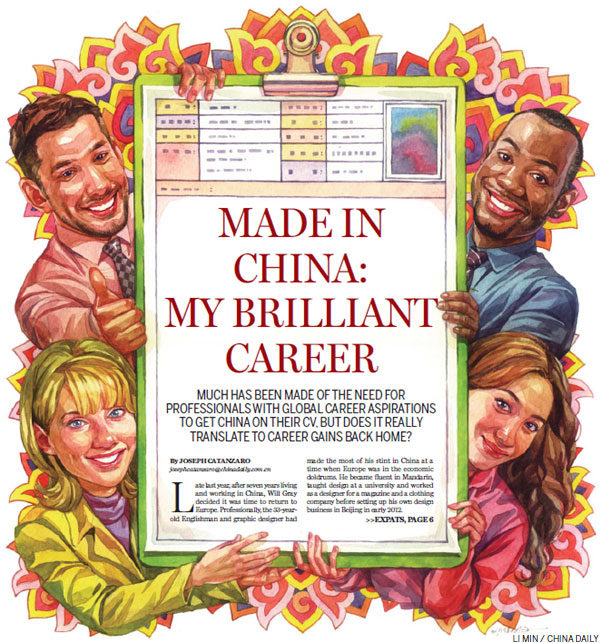
|
Martin Kraemer, executive with BL Acrylic Polymers, arrived in China in 2004. Photos provided to China Daily |
|
Will Gray, graphic designer. |
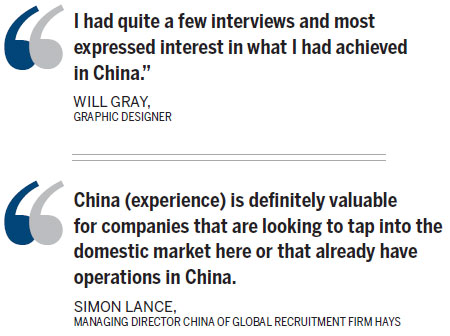
In the past 10 years, much has been made of the value of experience in China on a CV, particularly for foreign professionals in a wide range of sectors keen to break into senior and upper management roles elsewhere in the world.
But the unknown quantity for those expatriates already working in the world's second-largest economy, and professionals now considering taking the plunge and doing a stint in China, is whether or not the experience really does produce tangible career gains, new skills and a competitive edge in Europe and elsewhere.
The answer is a resounding yes, according to professionals in a range of sectors who talk of the career benefits they have enjoyed after working in China.
But while top headhunters and management consultants and academics agree that China experience has never been more valuable to global career advancement than it is now, the consensus is that adding China to one's resume is harder than it used to be.
The window of opportunity for foreigners looking to do their time in China, they say, is closing fast. And for those who do make it in the country and hope to make the most out of the experience, there are challenges to be tackled before the rewards are in reach.

When Gray began interviewing for roles in Germany, Denmark, the UK and the Netherlands, one thing quickly became apparent.
"They (potential employers) made it clear my China experience was very interesting to them," he says. "I had quite a few interviews and most expressed interest in what I had achieved in China."
Gray consciously made his China experience a central selling point in his CV, and he says the strategy worked to differentiate him in Europe's tough employment market. He ended up accepting a senior design role with a marketing and communications company in Sweden and believes his experience in China was the deciding factor.
Simon Lance, managing director China of global recruitment firm Hays, says generally China experience is becoming increasingly important to employers in places like Europe, the US and Australia.
"It's definitely on the rise, and you do hear it talked about in senior circles now," Lance says. "China (experience) is definitely valuable for companies that are looking to tap into the domestic market here or that already have operations in China."
Edward Tse is the founder and CEO of Gao Feng Advisory Co, a global strategy and management consulting firm rooted in China. Formerly head of China business for Boston Consulting Group and Booz & Co, Tse says that in general China experience on a CV is important and relevant in more cases than not. "International experience, by definition, is always a plus," he says. "And within international markets, China is one of the most important, if not the most important. So having a rotation through China is often critical for career development, (particularly) in large corporations."
But what constitutes China experience is changing, Lance and Tse say.
Lance says that traditionally experience in China was arguably seen as just "a box to tick" on the resume. Now potential employers and multinational companies rotating their staff through expect candidates coming out of China to possess real skills and resources.
Cross-cultural management, different ways of strategic thinking and good contacts and established networks are some of the obvious skills and assets employers now expect to see evidence of after a stint in China, Lance says.
In interview rooms across Europe, Gray found this to be the case.
"My company works with Ikea ... and they also did a project before I arrived with Ikea China," he says. "In the interview they talked about the difficulties with communication, and cultural differences, (they had) when working with Ikea China and how might I be able to aid that process in the future. Business here is very competitive, projects and clients are fought for very hard, and I think they saw me as an opportunity to reach a bit further than rural Sweden."
Adam Fairbrother, managing partner China for global executive search firm Odgers Berndtson, says an understanding of the Chinese consumer and an awareness of what employees experience on the ground are highly sought after qualities for senior appointments in Europe across a range of sectors.
"In some cases it's a very useful attribute to have on the CV," Fairbrother says. "It depends on the sector, but it demonstrates that you understand what is happening in the fastest growing market, in a market that is maturing across many sectors. Taking the kind of lessons learned from here would be fairly valuable. It's not necessarily that you can apply them in the UK. It's more that you can then appreciate what your teams are doing in Asia, and the kind of challenges they face on the ground."
Martin Kraemer, 48, arrived in China in 2004 as a result of an internal transfer he had requested from his then employer, Lanxess Chemical. The German-born executive was based in Shanghai for five years and held a number of roles for the company, including head of treasury, chief financial officer of greater China and CEO of greater China.
But he then ran into a hurdle that Tse says is common for foreign executives working in China, far from the head office.
"Someone who lives and works in China has a more realistic view (of China), but the danger is the final decisions are often made in head office," Kraemer says.
"There is a potential for conflict if you are the one running the show in China and you tell headquarters they have no idea. That can be very dangerous to an individual's career. I wasn't in total agreement with the direction my former company (Lanxess) was taking."
Drawing on the network of contacts he had made in the country, Kraemer jumped across to another German chemical giant, Evonik Industries, taking on a role in Shanghai as head of Asia.
"My China connections helped me make the move (between companies in China)," he says.
At the end of last year he returned to Germany and is now the head of BL Acrylic Polymers, one of Evonik's global lines.
Kraemer says his China experience has proven invaluable in Germany.
"We have business in Asia. Living in China, being exposed to the environment ... helps you to understand how people there think. It helps you develop an idea about what are things going to be like when China is even more influential. It becomes a part of your skill set. It's part of the experience you bring with you, and for many companies I think it (China experience) is now an important asset."
Beyond the rhetoric, Lance says, some of Hays' offices outside China are now coming looking for talent with China experience for roles in Europe and elsewhere. Many of the companies hiring are Chinese enterprises expanding overseas seeking employees who have both an intimate knowledge of the new local market and an understanding of Chinese business culture. Others are Western companies trying to capture outbound Chinese investment.
"We work with our offices in Germany, the UK and the US particularly looking at outbound Chinese investment and helping them source Westerners with Chinese experience or Chinese with Western experience," Lance says. "That for us is a real niche that's growing very quickly following the outbound investment from China."
Fairbrother says he is seeing a similar trend.
"We get asked to provide candidates who would be willing to move to the UK, or who are maybe on the move back to the UK. For example, non-executive director positions for businesses that are looking to grow into China. Also, we work with some Chinese clients, who shall remain nameless, but some fairly large telco and capital machinery organizations who are growing their businesses outside China. We work with them in the UK to find them senior advisers - Westerners who have been in China and who are back in the UK and back in Germany."
But inherent in this increasing demand for rounded professionals with both Western and China experience is a new challenge. Foreigners seeking roles in China increasingly have to compete with locals who have global experience, making it harder for expatriates to get the much-vaunted China box ticked on their CV.
"The trend is moving away from hiring expatriates toward hiring local returning Chinese candidates," Lance says. "Most of the expatriate movement to China is usually through internal transfers. The hiring volumes for out and out expatriates are declining, and I'd expect that to continue. The role of the expatriate in China now is less about completing a project or completing a task and more about passing on knowledge to local Chinese management and staff."
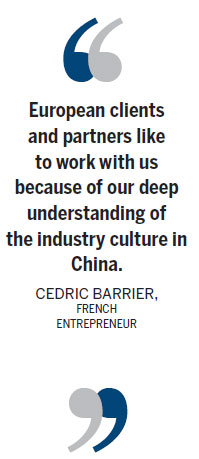
Fairbrother says that while local Chinese talent is maturing and generally cheaper to hire, there is still a small niche at the top of the game where Westerners are wanted and can subsequently do their China time.
"If the business is a business that is in slowdown, people are still using Western managers, some of the battle hardened people that have been through slower markets and slowdowns. The Chinese talent is not necessarily as mature as it could be in this kind of area."
Lance says other areas and sectors where China lacks skills and experience such as banking, risk and compliance, research and development for pharmaceuticals or high-tech manufacturing also present prime openings for foreigners.
And for those who do make it into China, the rewards are there, particularly opportunities to fast-track a global career.
"I think people are given a big challenge and more autonomy as the ambassador for their company in China," Fairbrother says. "You get more responsibility faster, and that's obviously very beneficial for your career."
Gray says this was certainly true in his case. Kraemer agrees the opportunities for advancement in China are bigger for junior or mid-level managers, but says there are some risks, particularly at the top end of a business.
"Many companies fail, then of course the blame is on the one responsible, even though it wasn't entirely in their hands. I still think the rewards are bigger than the risks though."
Terence Tsai, an associate professor of management at the China Europe International Business School, says there is another big opportunity for foreigners to use their China experience as a global springboard.
"For people who are very conscious about building up their network, they will notice their Chinese friends and contacts are getting wealthier and wealthier, and they are looking to take their business somewhere else in the world. Some will be looking for partners. Foreign management working in a multinational in China have proven to be good candidates to partner with. There are a lot of opportunities to do this these days."
Frenchman Cedric Barrier, 34, came to China in 2006 to take up a quality management role for a French SME. He quickly realized starting his own business with Chinese partners could be lucrative, and founded a company that designs, sells and operates programs that help Asian students enter higher-learning institutions in Europe.
Barrier is still living in Beijing, but his business has gone abroad, expanding into India, Vietnam and Indonesia.
"European clients and partners like to work with us because of our deep understanding of the industry culture in China," he says. "Chinese clients and partners like to work with us because we are able to understand them, anticipate their way of doing business and manage projects with an ability to make things happen despite the cultural gaps."
Tsai says China can be a challenging place to work for foreigners, which is why companies often take note of employees who do well there, earmarking them for further development and future leadership positions.
"If you can survive here (in China) for five years, and every year you are making KPI and every year you are performing well, you are really someone who is worth investing in," he says.
Frenchman Arnaud Favry, 27, spent five years in China working for a French industrial group.
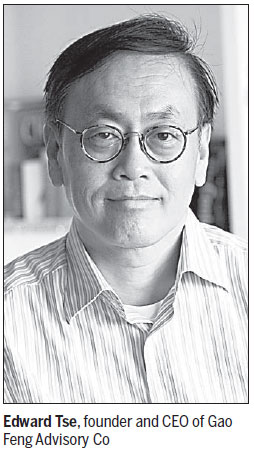
Impressed with his performance, Favry's company is now paying for him to study for an MBA at Harvard Business School, where his time in China is proving useful.
"Harvard Business School recruits mostly foreigners and Americans with a very strong international background," he says. "My multicultural professional experience, forged by five years spent in China, proved to be a real asset."
Even though China's economy is slowing, Fairbrother says it is still "top of the radar for most people's five-year strategy".
Kraemer says that is as it should be.
"If you look at the growth in absolute figures and the contribution to world growth, China still plays the major role. Even though China does not grow in the double digits anymore, over the years because it has added so much substance, the lower growth now even adds more to world growth than before. It's the biggest nation in the world in terms of population, it's the number two economy and growing much faster than the number one. China will keep being important."
Lance and Fairbrother say it is not farfetched to conceive of a near future when experience in China will be mandatory for senior management roles in global firms.
In fact, it is already happening, Tsai says.
"It's not something that's just nice to have; it's a requirement, particularly for middle and senior management roles. You must have it."
Kraemer says that if he was presented with two candidates applying for a job in his company, and the only distinction between them was that one had China experience, he knows who he would hire.
"It depends a little bit on the role, but in general I would say I'd hire the one with China experience."
josephcatanzaro@chinadaily.com.cn
|
Terence Tsai, an associate professor of management at the China Europe International Business School. Photos provided to China Daily |
|
Frenchman Cedric Barrier came to China in 2006 to take up a quality management role for a French SME. |
( China Daily European Weekly 03/13/2015 page1)
Today's Top News
China likely to ease again if inflation falls: insider
Reproach for wrongful convictions
China's two universities make top 50
Astronauts return from space station
Italian court upholds Berlusconi's acquittal
UK companies seek new opportunities in China
CNR, CSR merger passes overseas antitrust scrutiny
Official urges Dalai Lama to forsake evil ways
Hot Topics
Lunar probe , China growth forecasts, Emission rules get tougher, China seen through 'colored lens', International board,
Editor's Picks

|

|

|

|

|

|


